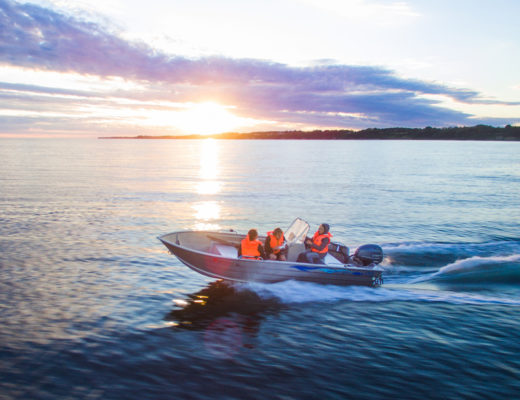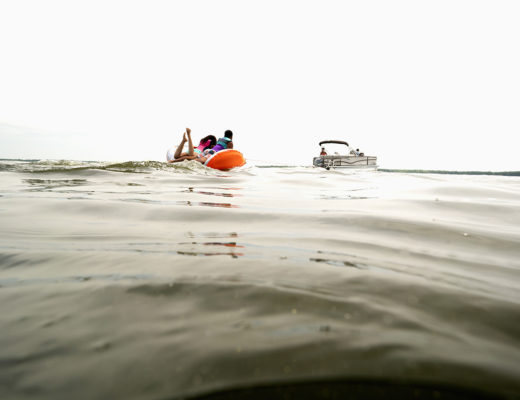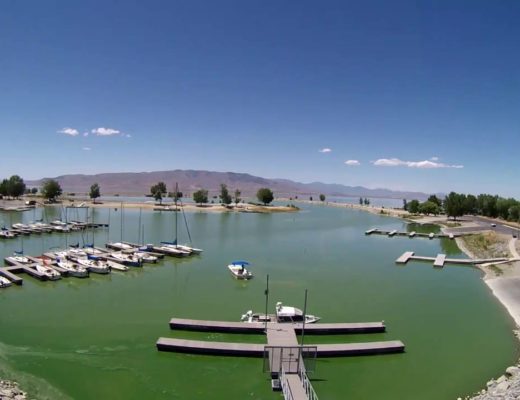Who needs a Vermont Boater Education Card?
All operators born after January 1, 1974, must have the Vermont Boater Education Card to operate a motorized vessel or personal watercraft (PWC) in the state of Vermont. Anyone under the age of 12 years may not legally operate any vessel powered by a motor of more than 6 horsepower. Anyone under the age of 16 years may not legally operate a PWC. The boater education card must be carried onboard the vessel during operation.
Vermont’s Life Jacket Requirements
All vessels must be equipped with U.S. Coast Guard-approved life jackets, called personal flotation devices (PFDs). The quantity and type depends on the length of your vessel and the number of people on board and/or being towed. Each PDF should be in good condition and fit the wearer properly. All PFDs must be accessible and not stored in a such as way that the passengers cannot access them easily.
In the state of Vermont, children 13 years of age and under are required to wear a U.S. Coast Guard approved life jacket or life vest when underway on an open deck boat. For persons under 16, an approved Type I, II, or III life jacket must be worn at all times while on a sailboard.
TYPE I (Off-Shore Life Jacket) (22 lbs. buoyancy) Best for open, rough or remote water, where rescue may be slow in coming.
TYPE II (Near-Shore Buoyant Vest) (15.5 ibs. buoyancy) Good for calm, inland water, or where there is good chance of fast rescue.
TYPE III (Flotation Aid) (15.5 lbs buoyancy) Good for calm, inland water, or where there is a good chance of fast rescue.
TYPE IV (Throwable Device) For calm, inland water with heavy boat traffic, where help is always nearby.
TYPE V (Hybrid Device) Required to be worn to be counted as a regulation PFD.
Vermont Boating License Requirements for Personal Watercraft (PWCS)
All operators born after January 1, 1974, must have the Vermont Boater Education Card to operate a motorized vessel or personal watercraft (PWC) in the state of Vermont. Anyone under the age of 12 years may not legally operate any vessel powered by a motor of more than 6 horsepower.
Boating and Alcohol
Vermont law prohibits operating or being in actual physical control of a vessel while intoxicated by drugs or alcohol. The term “vessel” includes “every description of watercraft, other than a seaplane on the water or a racing shell or rowing scull occupied exclusively by persons over 12 years of age, used or capable of being used as a means of transportation on water.” A person can be convicted of boating while intoxicated (BWI) for operating a vessel while:
- under the influence of drugs or alcohol “to a degree which renders the person incapable of operating safely,” or
- having a blood alcohol concentration (BAC) of .08% or greater.
The consequences of a Vermont BWI depend on the circumstances of the case. But generally, the consequences are:
- First, second, and subsequent offenses. Most BWIs carry up to one year in jail. And first offenders face $200 to $750 in fines, while second and subsequent offenders will have to pay fines of $250 to $1,000.
- BWI involving serious injury. A BWI involving “serious bodily injury” generally carries up to 15 years in prison and/or a maximum $5,000 in fines.
- BWI involving death. A BWI involving death to another person carries one to 15 years in prison and/or up to $10,000 in fines.
Vermont’s Boat Accident Reporting Requirements
An operator involved in an accident must stop his or her vessel immediately at the scene and assist anyone injured in the accident or minimize any danger caused by the accident, unless doing so would seriously endanger his or her vessel or passengers and give his or her name, address, and identifying number of his or her vessel in writing to anyone injured from the accident and to the owner of any damaged property.
The operator also must file an accident report with the Vermont DMV within 36 hours of the accident if:
- A person dies or disappears or…
- A person is injured requiring treatment beyond first aid or…
- Damage to the vessel and other property exceeds $100.
Vermont DMV Contact Information
For more information about safe boating in Vermont, contact the Vermont DMV: (877) 770-1778 or [email protected]






